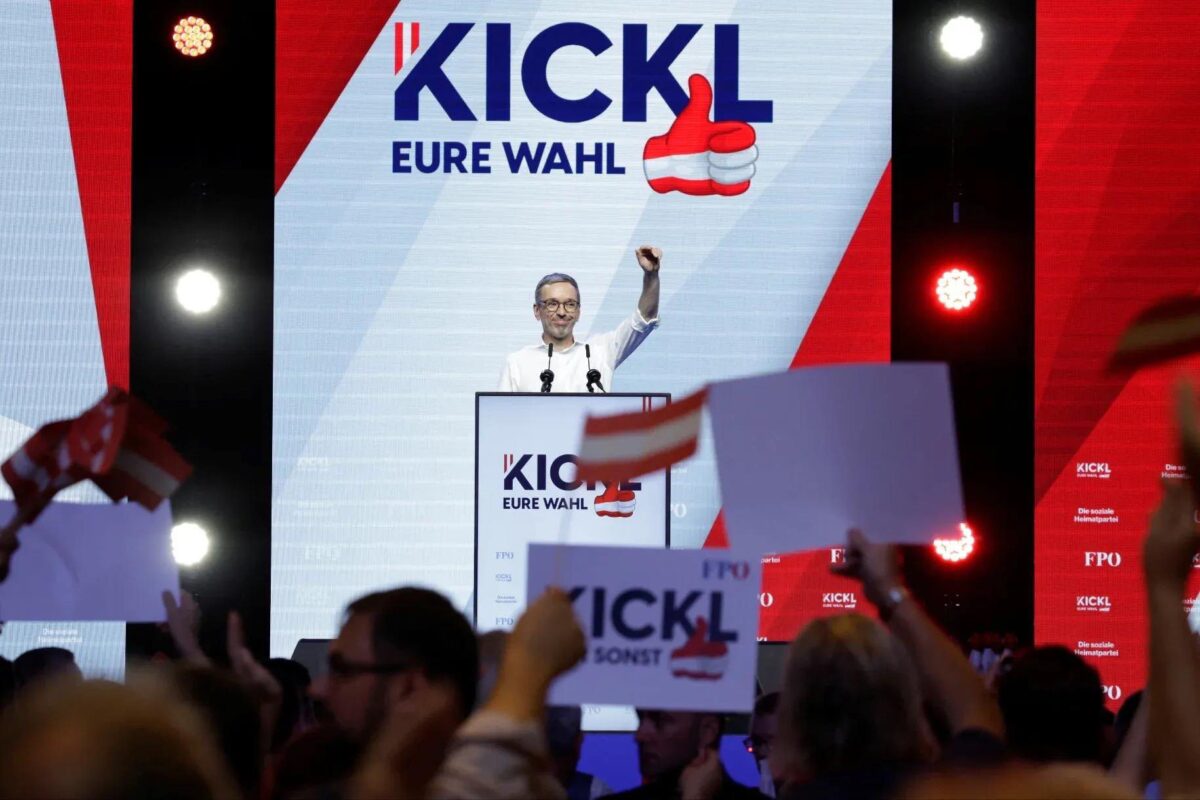
The anti-immigration, right-wing Freedom Party of Austria (FPÖ) achieved a historic victory on Sunday, September 29th. It won the Austrian national elections for the first time, defeating the mainstream parties, the centre-right People’s Party (ÖVP) and the Social Democrats (SPÖ)—who have taken turns governing the country since the end of World War II.
The FPÖ won 29.2% of the votes—its best ever result—and 58 seats in the 183-seat parliament. The party almost doubled its share of the vote from 2019 when it received 16.2%.
Wir haben heute Geschichte geschrieben! 🇦🇹 Danke an euch ALLE! 💙 pic.twitter.com/XFHo2FCEJ0
— FPÖ (@FPOE_TV) September 29, 2024
The ÖVP, which has governed Austria for the past five years in a coalition with the Greens, finished in second place with 26.5% and 52 seats—a significant drop from the 37.5% it got five years ago, but a turnaround compared to its polling numbers of 19-20% only a few months ago. Experts believe ÖVP leader Chancellor Karl Nehammer’s tough words on migration may have resulted in a boost for the party.
The opposition Social Democrats also lost support, dropping from 21.2% to a new low of 21.1%, their worst result ever, although they still managed to increase their number of seats from 40 to 41.
The two remaining parties that succeeded in passing the 5% threshold to enter parliament were the opposition liberal NEOS party with 9% of the votes and 17 seats, and the governing Greens with 8% and 15 seats.
Voters’ top concerns going into the election were migration, crime, inflation, and the cost-of-living, with FPÖ vowing to implement tough immigration and asylum policies if it came to power. Party leader Herbert Kickl praised voters for their “optimism, courage and trust” in delivering a “piece of history.” During the campaign Kickl promised to suspend asylum applications, put in place a real border protection system, enable pushbacks, and consistently deport failed asylum seekers.
Patriotic parties all across Europe celebrated the FPÖ’s victory.
“After the Italian, Dutch and French elections, this tidal wave which supports the defence of national interests, the safeguarding of identities and the resurrection of sovereignties, confirms the triumph of the people everywhere,” Marine Le Pen of the French National Rally wrote in a post on X.
Nous nous réjouissons de la victoire aux législatives autrichiennes du FPÖ, notre allié au Parlement européen. Après les scrutins italiens, néerlandais et français, cette lame de fond qui porte la défense des intérêts nationaux, la sauvegarde des identités et la résurrection des…
— Marine Le Pen (@MLP_officiel) September 29, 2024
Dutch nationalist Geert Wilders, whose PVV party leads the Dutch government, said: “We are winning! Times are changing! Identity, sovereignty, freedom and no more illegal immigration/asylum is what tens of millions of Europeans long for!”
The Netherlands, Hungary, Belgium, Italy, Germany, Portugal, Sweden, France, Spain, Czech Republic and today Austria!
— Geert Wilders (@geertwilderspvv) September 29, 2024
We are winning!
Times are changing!
Identity, sovereignty, freedom and no more illegal immigration/asylum is what tens of millions of Europeans long for!
❤️
Italian Deputy Prime Minister Matteo Salvini of the co-ruling League party said: “To those who speak of the ‘extreme right,’ let us remind them that in Vienna (as in almost all of Europe) there is only the desire for change by putting the values of work, family and security back at the centre.”
🇦🇹 Complimenti agli amici e alleati dell’@FPOE_TV che, secondo gli exit poll, hanno vinto le elezioni diventando primo partito in Austria. Una giornata storica nel nome del cambiamento.
— Matteo Salvini (@matteosalvinimi) September 29, 2024
A chi parla di “estrema destra”, ricordiamo che a Vienna (come in quasi tutta Europa) di…
Hungarian Foreign Minister Péter Szijjártó wrote on Facebook: “What a weekend!! After the Czech Republic, another victory for the Patriots across the border. No war, no migration and no gender propaganda!” Hungarian Prime Minister Viktor Orbán, whose Fidesz party is an ally of FPÖ within the Patriots for Europe party, also congratulated Herbert Kickl.
Another win for the #Patriots: an historic victory for #FPÖ in #Austria! Congratulations to Herbert Kickl!
— Orbán Viktor (@PM_ViktorOrban) September 29, 2024
Despite FPÖ being given the mandate to lead the next government, other parties were quick to dismiss the will of the voters, saying they would not enter into a coalition with the FPÖ, which needs a partner to hold a majority in parliament. Its only realistic coalition partner would be the centre-right ÖVP, which it allied with previously between 2017-19.
The two parties also govern the states of Lower Austria, Salzburg, and Upper Austria together. Yet Karl Nehammer has said his party will not join a government with Kickl in it. While Nehammer has accused Kickl of believing in and spreading “conspiracy theories,” SPÖ leader Andreas Babler called FPÖ a “danger to democracy.”
On election night the chancellor said his party, in contrast to the FPÖ, represented “the centre and common sense.” Herbert Kickl said he was ready to negotiate with anyone, and questioned whether the other party leaders still believe in democracy.FPÖ General Secretary Christian Hafenecker recommended that Chancellor Karl Nehammer resign. With such a “historic defeat” there is “only one consequence,” he said. Hafenecker also stressed that he wanted to enter into coalition talks with other parties. Despite voters’ resounding approval for shifting Austrian politics to the Right, the desire by the other parties to isolate FPÖ means Austria could end up with a government on the Left. The most likely scenario is that the grand coalition of old, between the ÖVP and the Social Democrats will be reformed—a format that dominated Austrian politics for many decades. Another option would be to extend that coalition with a third partner, the Greens or NEOS.
